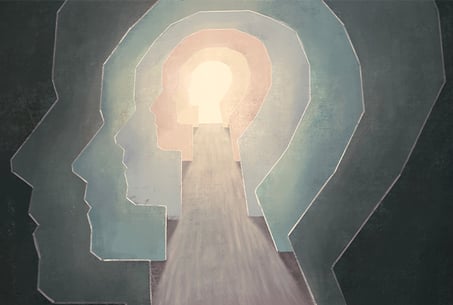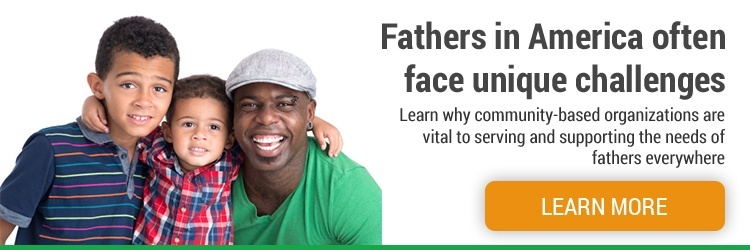
If you run a group-based fatherhood program, take note that you’re undoubtedly helping dads address an issue that’s gaining more attention—and it’s about time.
What’s the issue?
Men’s mental health.
As someone who struggles with anxiety, I applaud the work of practitioners like you who bring dads together for growth in their fatherhood journey.* That’s because fatherhood groups—no matter the topics they focus on—by their nature help dads reduce anxiety and depression and recover from addiction.
How?
By creating social connections that help address a “friendship recession” among men, a term used to describe increasing loneliness among men that leads to isolation. Fatherhood groups create a “tribe” of men who bond for the common purpose of growing as dads and men. This tribe becomes a positive, generative part of dads’ identities that breaks the shackles of loneliness and isolation and opens the door to connecting with their children, partners, and communities. Fatherhood groups create the friendships that the longest-running study on what makes men happy says are key to a good life.
Johann Hari is a leading authority on the power of social connection in addressing anxiety, depression, and addiction. I learned recently about his work in this podcast. I was struck by the logic of his argument that we focus too much on medicalizing mental health challenges while ignoring their social causes.
Hari doesn’t discount the biological bases that affect susceptibility to mental health issues or the role medication can play in addressing them. He emphasizes that those bases paint an incomplete picture without acknowledging the role played by social disconnection. When we focus too much on the biology of mental health issues, we look at them as “malfunctions” with pharmacological solutions rather than as “signals” with something to hear and heed about social environments that have become more and more isolating.
After listening to the podcast, I searched for more about what Hari says about the effects of social environments on mental health. I found his Tedx talks on anxiety and depression (20 minutes) and addiction (14 minutes) helpful. I encourage you to watch them and show them to the dads you serve. Hari does a fantastic job summarizing the research on the impact of social environments. Dads will enjoy the humor he uses.
I also encourage you to look for other resources on men’s mental health to integrate into your work with dads. When fatherhood groups address mental health specifically, dads benefit even more from them. (That’s why the evidence-based and evidence-informed fatherhood programs of National Fatherhood Initiative® cover the importance of dads caring for their mental health.) When you integrate these resources, you create a social norm that gives dads the freedom to examine their mental health, thus reducing the stigma associated with that help-seeking behavior.
Did you know that men are much less likely than women to seek support for their mental health?
Are you looking for more resources on mental health to integrate into your work with dads? If so, check out Mental Health America and the National Alliance on Mental Illness, two trustworthy sources. Their websites have a lot of content and resources that will help you and the dads you serve learn about mental health.
Would you like more NFI resources on mental health specifically tailored for dads? If so, I have good news. We’re developing more resources on dads’ mental health that we’ll release in the coming months. Subscribe to our free eNews to be among the first to know about those and other new resources, and updates to existing resources.
* I’ve struggled with anxiety since childhood. At times, it’s been debilitating. Fortunately, I found team sports and other group-based activities with other boys helpful. In my adult years, I’ve found the following tools helpful: men’s groups, exercise (cross-training), nutritional supplements, meditation, and practicing gratitude. The key to realizing the full potential of these tools has been in my intentional, disciplined application of them.
